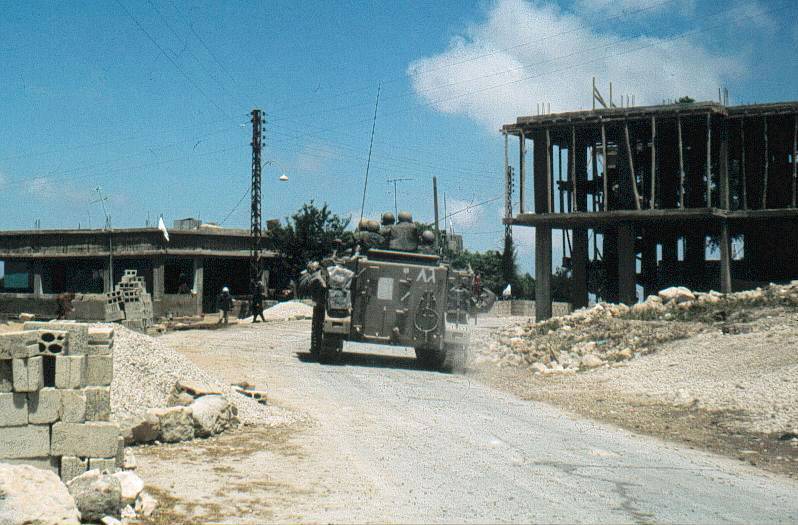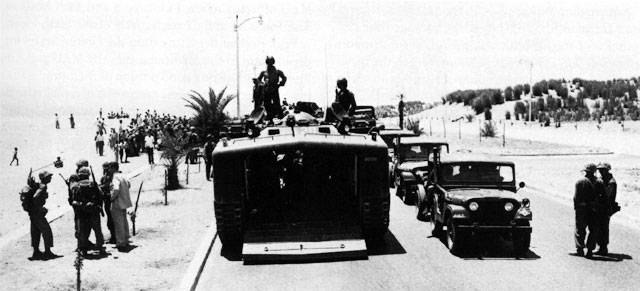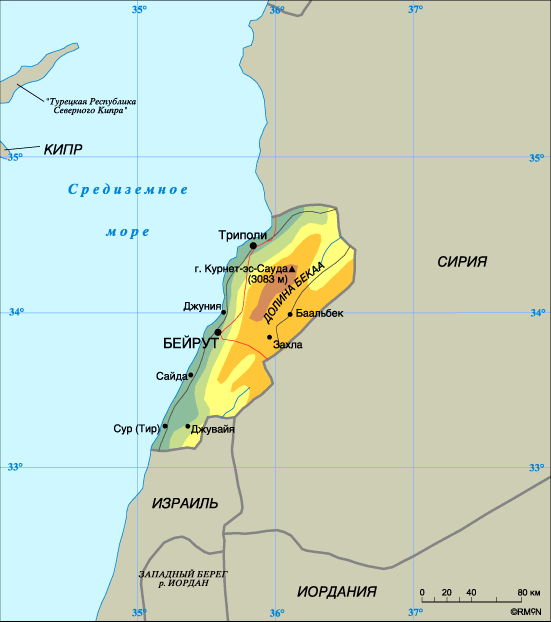How did the Lebanese war of the year 1982 begin

The current war in Syria and Iraq (the “Middle East Front”) makes us recall the relatively recent historical by the standards, the USSR’s confrontation with the USA and Israel, where Syria also acted as a battlefield. Damascus was then an ally of Moscow in the struggle against the establishment of American order in the Middle East. During the Lebanon War of 1982, Israel and Syria waged a high-tech war in Lebanon. The battle was land, air and partly naval. The USSR then confidently won in one of the battles of the so-called. Cold War (more precisely, the Third World War).
The confrontation began with the civil war in Lebanon. The Lebanese civil war was caused by three major factors. First, it is a strong religious and ethnic heterogeneity of Lebanese society, which caused opposition to the Christian and Muslim parts of the country. The Christian civilization in the Middle East experienced a sunset, and the Muslim and Arab, on the contrary, a surge of passionarity. However, in Lebanon, Christians historically had some advantage, therefore Muslims, with the growth of their number and military-political power, decided to turn the tide in their favor.
Secondly, it is the Palestinian factor. Palestinians-Arabs lost in the fight against the Jews, who did not create an Arab Palestinian state and seized the lands that had long been settled by Arabs. Jews believed that the Palestinian Arabs already have their own state - Jordan. Palestinians fled en masse to Jordan, then to Lebanon. The Palestinian radical militarized organizations, realizing their goals in the struggle against Israel, for which they needed a base and resources, destabilized Jordan and Lebanon. However, in Jordan there was a strong army, created with the help of Western states, which was able to maintain order. There was no strong army in Lebanon. The Palestinians strengthened the Muslim community in Lebanon, destroyed order in the state.
Thirdly, it is the intervention of external forces that had their interest in Lebanon and in the region as a whole. These are the actions of Israel, the USA, Syria (supported by the Soviet Union), and other Arab countries. Thus, the conflict between Arab countries and Israel over water and resources led to a series of wars that destabilized the entire region, in particular, Lebanon.
Lebanon sought to avoid intervention in the 1967 and 1973 Arab-Israeli wars. However, after 1967, Palestinian guerrillas repeatedly attacked Israel from refugee camps in Lebanon. Armed actions in return followed, and the Lebanese government attempted to limit Palestinian attacks from its territory. The situation was finally destabilized by the civil war in Jordan, during which King Hussein expelled the armed forces of the Palestine Liberation Organization (PLO) from Jordan. The influx of Palestinian Arabs into the country has placed Lebanon at the center of the confrontation between Israel, Syria and the Palestinians. It also split Lebanese society over the PLO’s stay in Lebanon and the participation of Palestinians in the country's political life, and destroyed the confessional balance in the country.
Lebanon
Lebanon is a small country in the Middle East, located in a mountainous area on the eastern shore of the Mediterranean. In the east and north it borders with Syria, in the south - with Israel. State formations in Lebanon originated in ancient times, but they are not related to the modern Arab state. Lebanon is known for having established the famous trading state of Phenicia on its territory. Phenicia flourished in the 1200-800 years. BC e. In the VI century BC. e. Phenicia came under the rule of the Persians, led by Cyrus the Great, becoming part of the Persian Empire. In 332 BC. e. Alexander of Macedon made a trip to Phenicia, destroying its largest city - Tire. With the collapse of the Macedonian empire, Lebanon became part of the Seleucid Kingdom, and at the end of the 1st century BC. e. - Roman Empire. In the period of the Arab conquests and the formation of the Caliphate, Lebanon became part of the Islamic and Arab world. In the XII century during the crusades, Lebanon became part of the kingdom of Jerusalem Crusaders. In 1261, the crusaders were expelled from Lebanon by the Egyptians, and Lebanon was part of Egypt until the 1516 year. In 1517, the Turkish Sultan Selim I annexed this territory to the Ottoman Empire.
The territory of Lebanon as part of Greater Syria has been part of Turkey for more than 400 years. After the defeat of the Ottoman Empire in World War I and the collapse of the empire, the territory of Greater Syria was occupied in 1918 by British troops. By agreement of Sykes-Picot from 1916 between the countries of the Entente, the territory of Syria was transferred to France. The French received a management mandate from the League of Nations. In 1926, the territory of Lebanon was separated from Syria, and Lebanon became a separate territorial unit, however, managed by the French administration. In 1940, France was occupied by the Third Reich. In Lebanon, formed a national government. In 1943, Lebanon officially gained independence.
Thus, due to its convenient geographical location (which was appreciated by the ancient Phoenician traders, as well as their predecessors and heirs), Lebanon became the place of intersection of many ancient and modern cultures, religions and civilizations. The country stood out among other Arab states for religious and national diversity, while from the early Middle Ages the Christian community prevailed, which received some privileges during the rule of the French. Both Christianity and Islam in Lebanon are presented in the form of a wide variety of confessions. The largest communities are: Sunni, Shia, and Maronite (Maronite Catholic Church). Therefore, the unwritten “National Pact” in 1944 established a rule according to which a Maronite Christian should be president of the country, a Sunni Muslim should be prime minister, and a Shiite Muslim should be the speaker of parliament. The constitution adopted on the basis of the National Pact reinforced the religious fragmentation that existed in Lebanon. Parliament seats were divided into 6 / 5 proportions, where 6 are Christians and 5 are Muslims.
However, gradually the balance of power began to shift in favor of the Muslims, which happened with the growth of their numbers. In 1948, Lebanon took part in the first Arab-Israeli war. Tens of thousands of Arab refugees who had strengthened the Muslim community moved to Lebanon. As a result, controversies between Christians and Muslims began to intensify in the 1950s. During the Suez crisis, the pro-Western President Camille Chamoun (Maronite by religion) did not break off diplomatic relations with the Western powers that attacked Egypt, which led to a diplomatic conflict with Cairo. In response to the President’s actions, the Muslim community formed the National Front, demanding a policy of “positive neutrality” and friendship with Arab countries. Mass political demonstrations took the form of a Muslim uprising in May 1958, led by former prime ministers Rashid Karame and Abdullah Yafi and chairman of parliament Hamade. It quickly grew into a civil war. She managed to stop only with the help of American intervention (operation "Blue bat"). American troops were able to quickly take control of the situation. President Chamoun was persuaded to resign, moderate Fuad Shehab took his place. One of the rebel leaders, Rashid Karame, became prime minister. Conflict between religious communities was temporarily stabilized.
It is worth noting that at this time Lebanon was a prosperous state, the financial and banking capital of the Arab world. Lebanon remained aloof from the Arab-Israeli conflicts, maintained neutrality, trying to maintain good relations with both its Arab neighbors and the countries of the West. For which he received the unofficial name "Middle Eastern Switzerland". Lebanon was also popular with tourists. The mild Mediterranean climate in the narrow seaside valley, the most beautiful cedar groves, the cleanest sea and the monuments of ancient cultures seemed to secure for this country the reputation of a tourist paradise. Beirut was considered the “pearl” of the Middle East. However, it was not possible to preserve this status due to the religious split in the country, the intensification of Arab nationalism and the absence of a strong army that could preserve the existing situation in the conditions of the influx of Palestinian refugees.

US forces in Beirut in 1958
The confrontation of the Arab countries and Israel. "Black September"
The six-day 1967 war ended with Israel’s victory over the Arab coalition. Arab countries had multiple numerical superiority over the armed forces of Israel. The technical level of weapons of Arab countries and Israel was about equal. However, the Arabs overestimated their strength. Israel hit first, and by concentrating forces in one direction, it consistently defeated opponents. The war cost the Arabs the loss of control over East Jerusalem, the loss of the West Bank, the Gaza Strip, Sinai and the Golan Heights on the Israeli-Syrian border. This provided the Israeli armed forces with strategic superiority over their neighbors, even in terms of their numerical superiority.
From 1967 to 1970, there was a war of "exhaustion" between Egypt and Israel. The ideologist of this war was Egyptian President Nasser. He believed that continuous artillery shelling and aviation strikes will force the Jewish state to constantly keep the armed forces on alert, which will lead to major economic problems. This, in his opinion, should have forced the Israeli leadership to comply with UN Security Council resolution No. 242 on the withdrawal of Israeli troops from the occupied territories. However, Israel has withstood the mobilization regime. At this time, Egypt, with the help of the USSR, built a powerful air defense system, step by step bringing the S-75 and S-125 batteries to the Suez Canal, and Israel mercilessly bombed the enemy. The Soviet air defense specialists, who caused heavy damage to the Israeli air force, were directly involved in the hostilities. As a result, on August 7, a truce was concluded between Israel and Egypt.
After the end of the Six Day War 1967 and the establishment of Israeli control over the West Bank, a large number of Palestinian refugees settled in the Kingdom of Jordan, and the territory of the country became a logistical base for the Palestine Liberation Organization (PLO). Also in Jordan, most of the radical groups of Palestinian Arabs were founded. This caused the external and internal destabilization of Jordan: the conflict with Israel, the attempts of the Palestinians to gain autonomy in the kingdom, which led to clashes of Palestinians with the Jordanian security officials. In the 1969 year, when under the auspices of the United States, it came to concluding a separate peace between Israel and Jordan, leftist radical groups of Palestinians, worried about this prospect, which clearly did not envisage the creation of an independent Palestinian state, force military actions against Israelis. King Hussein’s power swayed.
At the end of July 1970, Egypt and Jordan unexpectedly announced that they support the American Middle East settlement plan (Rogers plan). This was the formal end to the “war of attrition”. Palestinian leftist organizations have decided to fail this plan. Palestinian radicals planned to overthrow the Jordanian King Hussein and create a new state entity on the "east bank of the Jordan River." As a result, September 1970 of the year went down in history as “Black September”. On 1 of September 1970, Palestinian militants attempted the assassination of the king, which failed. At the same time, the militants made several hijackings of aircraft. This has led to increased outrage among Palestinians in the world. Hussein decided that the time for a tough answer had come.
On September 16, Hussein announced the introduction of martial law, and in the evening Tanks The 60th Armored Brigade entered Amman from all sides and, with the support of motorized infantry, began storming the camps and the fortified positions of the Palestinians. Palestinians fought stubbornly. Moreover, the Palestine Liberation Army (led by Yasser Arafat), the PLO military wing, was actively supported by Syria. A division of the Syrian army invaded Jordan, but it was stopped by Jordanian forces. In addition, Israel and the United States expressed their willingness to support Jordan. Damascus withdrew troops. Without the support of the Syrians, the Palestinians could not stand it. Royal artillery and aviation consistently destroyed Palestinian camps in Amman and the surrounding area. The army was advancing on all the strongholds of the Palestinians. Palestinians agreed to a ceasefire.
Arafat and Hussein went to the summit of Arab leaders in Cairo. And there 27 September 1970, the recent winner King Hussein was forced to sign an agreement leaving the Palestinian militant organizations the right to act in Jordan. It seemed that Arafat won a full diplomatic victory. However, September 28 at the age of just 52 years suddenly died Egyptian President Nasser. And in Syria, just two months later, a military coup occurred. Syrian Defense Minister Hafez Assad became president of the country. For a while, the Syrians had no time for Jordan. Hussein had the opportunity to add the situation in his favor. Arafat realized that he had lost and signed an agreement with Hussein, which fully recognized the sovereignty of the Jordanian king. However, this agreement was not accepted by left-radical groups, which continued to resist until the summer of 1971. Their defeat was complete. PLO militants led by Yasir Arafat and representatives of other factions were forced to flee to Lebanon. Tens of thousands of Palestinian refugees poured into Lebanon.
Thus, Lebanon received a “gift” from Jordan - tens of thousands of refugees, among whom was a radical core, armed and ready for action. At the same time, Lebanon, unlike Jordan, did not have a strong army that would be able to “reassure” the Palestinian militants. And within the country there was already a conflict between Christians and Muslims, a split into the Christian and Arab elites. The arrival of the "army" of Palestinian refugees intensified the internal conflict in Lebanon.
Civil war in lebanon
The status of Palestinian refugees in Lebanon was determined by the provisions of the Cairo Agreement between the Chairman of the PLO Executive Committee Y. Arafat and the Commander-in-Chief of the Lebanese Army, General Bustani. The agreement was signed on November 3 1969 of the year through the mediation of Egypt and Syria and the active support of the League of Arab States (LAS). Palestinians had the right in Lebanon to work, reside and participate in the resistance movement, to participate in the Palestinian revolution while respecting the sovereignty and security of Lebanon. Lebanon agreed to be present in the refugee camps of Palestinian armed forces.
Palestinian militants in Lebanon acted as in Jordan. The PLO, with the active assistance of a number of Arab countries, turned South Lebanon into a stronghold in its actions against Israel, into an operational and training base for militants and a number of radical organizations. The territory adjacent to the northern border of Israel was completely controlled by the PLO and even received the name Fathland. Palestinian militants launched attacks against Israeli territory from Lebanese territory. In turn, Israel conducted military operations in the border areas of southern Lebanon before the start of the civil war in Lebanon.
As a result, the Palestinians created their "state within a state" in Lebanon. Palestinian camps and settlements have become pockets of crime and terrorism. In 1973, the Palestinians won the right to have their own armed forces in Lebanon. Especially from the arbitrariness of the Palestinians the population of South Lebanon suffered, where mostly Maronite Christians and Shiite Muslims lived. The aggressive actions of Palestinian militants led to the complete destabilization of the country and finally split the country on religious grounds. The Muslim elite of Lebanon decided to use the presence of a large number of Palestinian militants, mostly Sunni Muslims, to redistribute power in the country to their advantage, limiting the rights of the Christian community. The Lebanese army was traditionally weak and could not crush the Palestinian radicals, as happened in Jordan. Therefore, the Christians took the path of organizing their own self-defense units (militia). Their armed detachments also formed in other religious communities and parties, both in solidarity with the Palestinians and those who opposed the Palestinian presence.
Thus, in the end, in 1975, a full-scale civil war began in the country. Lebanon has split along political and confessional lines: right-wing Christians against left-wing Muslims, including Palestinians.

To be continued ...
Information